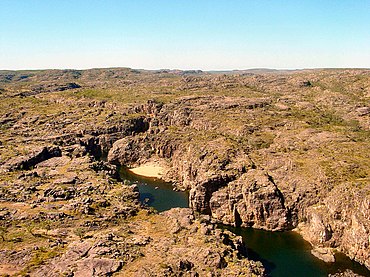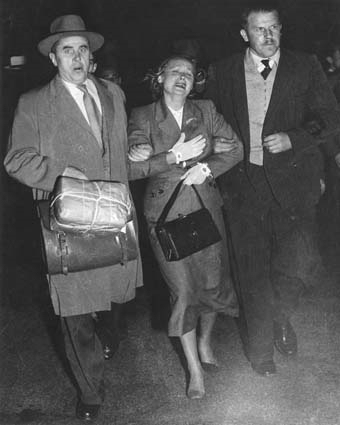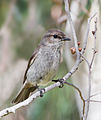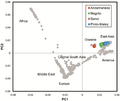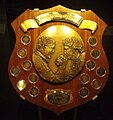Portal:Australia
| Showcase | Content | Interesting facts | Contributing |
Introduction

Australia, officially the Commonwealth of Australia, is a country comprising the mainland of the Australian continent, the island of Tasmania and numerous smaller islands. Australia has a total area of 7,688,287 km2 (2,968,464 sq mi), making it the sixth-largest country in the world and the largest country by area in Oceania. It is the world's oldest, flattest, and driest inhabited continent, with some of the least fertile soils. It is a megadiverse country, and its size gives it a wide variety of landscapes and climates including deserts in the interior and tropical rainforests along the coast.
The ancestors of Aboriginal Australians began arriving from south-east Asia 50,000 to 65,000 years ago, during the last glacial period. By the time of British settlement, Aboriginal Australians spoke 250 distinct languages and had the oldest living culture in the world. Australia's written history commenced with Dutch exploration of most of the coastline in the 17th-century. British colonisation began in 1788 with the establishment of the penal colony of New South Wales. By the mid-19th century, most of the continent had been explored by European settlers and five additional self-governing British colonies were established, each gaining responsible government by 1890. The colonies federated in 1901, forming the Commonwealth of Australia. This continued a process of increasing autonomy from the United Kingdom, highlighted by the Statute of Westminster Adoption Act 1942, and culminating in the Australia Acts of 1986.
Australia is a federal parliamentary democracy and constitutional monarchy comprising six states and ten territories. Its population of more than 28 million is highly urbanised and heavily concentrated on the eastern seaboard. Canberra is the nation's capital, while its most populous cities are Sydney and Melbourne, both with a population of more than 5 million. Australia's culture is diverse, and the country has one of the highest foreign-born populations in the world. It has a highly developed market economy and one of the highest per capita incomes globally. Its abundant natural resources and well-developed international trade relations are crucial to the country's economy. It ranks highly for quality of life, health, education, economic freedom, civil liberties and political rights.
Featured article -
Section 116 of the Constitution of Australia precludes the Commonwealth of Australia (i.e., the federal parliament) from making laws for establishing any religion, imposing any religious observance, or prohibiting the free exercise of any religion. Section 116 also provides that no religious test shall be required as a qualification for any office or public trust under the Commonwealth. The product of a compromise in the pre-Federation constitutional conventions, Section 116 is based on similar provisions in the United States Constitution. However, Section 116 is more narrowly drafted than its US counterpart, and does not preclude the states of Australia from making such laws. (Full article...)
Selected biography -

Sir Frank Macfarlane Burnet OM AK KBE FRS FAA FRSNZ (3 September 1899 – 31 August 1985), usually known as Macfarlane or Mac Burnet, was an Australian virologist known for his contributions to immunology. He won a Nobel Prize in 1960 for predicting acquired immune tolerance. He also developed the theory of clonal selection. (Full article...)
Did you know (auto-generated) -
- ... that the Greco-Australian dialect, a variety of Modern Greek, blends words with English roots into the Greek language?
- ... that the dominant species in the Iron-grass Natural Temperate Grassland of South Australia are often not grasses at all?
- ... that in 2010, Lauren Mitchell became the first Australian female artistic gymnast to win a world title?
- ... that an Australian wildlife conservationist has trapped and killed more than 1,450 feral cats?
- ... that in 1919 nurse Hilda Hope McMaugh became the first Australian woman to qualify as a pilot?
- ... that in 1939, a teenage Robin Ordell became the youngest radio announcer in Australia?
- ... that a newspaper in Kentucky reported that the solar eclipse of November 22, 1900, would pass over Austria instead of Australia?
- ... that "The Potato King of Colorado" survived a shipwreck, mined for gold in Australia, and helped establish an alcohol-free Methodist colony?
In the news
- 30 September 2024 – Australia–Tuvalu relations, Climate change in Tuvalu
- Tuvalu's climate minister denounces the Australian Labor government's decision to expand three coal mines as an existential threat to the nation, due to the role of the mines in causing rising sea levels that have forced mass displacement across Tuvalu's low-lying islands. (The Guardian)
- 28 September 2024 – 2024 AFL premiership season
- The Brisbane Lions defeat the Sydney Swans 120–60 in the Australian Football League Grand Final to win their fourth AFL premiership title. (The Guardian Australia)
- 26 September 2024 – Israel–Hezbollah conflict
- Israel rejects proposals from the United States, Australia, and the European Union to initiate a temporary 21-day ceasefire with Hezbollah. (Reuters) (Reuters 2)
- 23 September 2024 – 2024 AFL season
- In Australian football, Patrick Cripps wins his second Brownlow Medal with 45 votes, the most votes since the current voting system was introduced, and also becomes the seventeenth player to win the award more than once. (ABC News Australia)
Selected pictures -
On this day
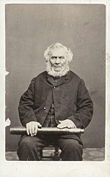
- 1800 – First copper coins circulated in New South Wales.
- 1813 – George William Evans, assistant surveyor, sets out to confirm the earlier discoveries of Blaxland, Lawson and Wentworth.
- 1834 – The first permanent European settlement on the north coast of Bass Strait is established at Portland.
- 1937 – Hubert Opperman completes an epic bicycle ride from Fremantle, Western Australia to Sydney, taking 13 days, 10 hours and 11 minutes.
- 1941 – The cruiser HMAS Sydney is involved in a mutually destructive battle with the German ship Kormoran off Western Australia. All 645 aboard Sydney die.
- 1996 – US President Bill Clinton makes a visit to Australia in which he addresses both Houses of Parliament.
- 1996 – Martin Bryant is sentenced to 35 consecutive sentences of life imprisonment plus 1035 years without parole for the Port Arthur massacre.
General images
Topics
More portals
WikiProject
 |
 |
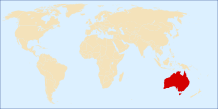
| |
Consider joining WikiProject Australia, a WikiProject dedicated to improving Wikipedia's coverage of topics related to Australia. The project page and its subpages contain suggestions on formatting and style of articles, which can be discussed at the project's notice board. To participate, simply add your name to the project members page.
As of 19 November 2024, there are 205,576 articles within the scope of WikiProject Australia, of which 594 are featured and 885 are good articles. This makes up 2.97% of the articles on Wikipedia, 5.34% of all featured articles and lists, and 2.18% of all good articles (see WP:AUSFG). Including non-article pages, such as talk pages, redirects, categories, etc., there are 526,382 pages in the project.
Associated Wikimedia
The following Wikimedia Foundation sister projects provide more on this subject:
-
Commons
Free media repository -
Wikibooks
Free textbooks and manuals -
Wikidata
Free knowledge base -
Wikinews
Free-content news -
Wikiquote
Collection of quotations -
Wikisource
Free-content library -
Wikiversity
Free learning tools -
Wikivoyage
Free travel guide -
Wiktionary
Dictionary and thesaurus











